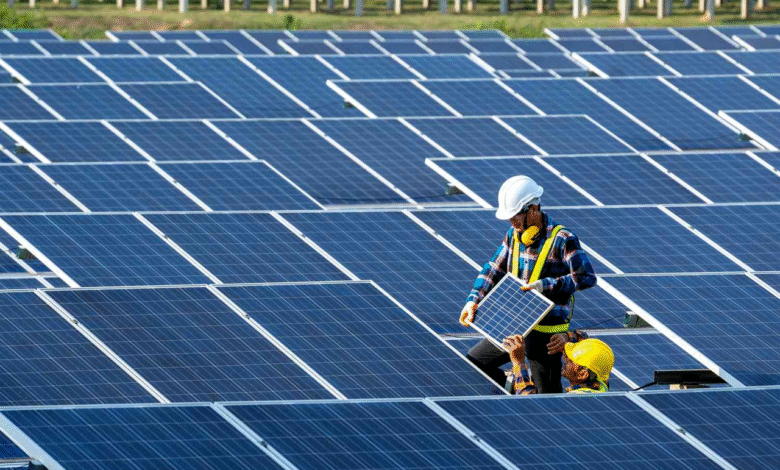
In the global pursuit of sustainable and eco-friendly energy alternatives, the United Kingdom has emerged as a trailblazer, showcasing a steadfast commitment to renewable energy technology. As the energy demand escalates and the environmental repercussions of traditional energy sources become more apparent, the UK’s proactive approach stands out. This article explores the multifaceted journey of how the UK is spearheading the global shift towards cleaner and more sustainable energy sources.
Read More: Top 7 Technologies Transforming Energy In 2023
Historical Context

To comprehend the UK’s current leadership in renewable energy, it’s imperative to glance back at its historical trajectory. The roots of the country’s commitment to clean energy can be traced to early initiatives aimed at reducing dependence on fossil fuels. Over time, strategic decisions and policy implementations have laid the groundwork for the UK’s present prominence in the renewable energy sector.
Government Initiatives
Central to the UK’s success in renewable energy is the government’s unwavering support and foresight. A series of progressive policies, incentives, and ambitious targets have created an environment conducive to the development and widespread adoption of clean energy solutions. The government’s commitment plays a pivotal role in fostering innovation and attracting investments.
Technological Advancements
The landscape of renewable energy technology is characterized by continuous innovation, and the UK stands at the forefront of these advancements. The country’s commitment to research and development has led to groundbreaking improvements in the efficiency, affordability, and scalability of renewable technologies. From improved solar panel designs to more efficient wind turbines, the UK is actively shaping the future of sustainable energy.
Wind Power Revolution
One of the most notable areas where the UK has excelled is in the harnessing of wind power. Ambitious wind energy projects, both onshore and offshore, coupled with innovations in turbine technology, have positioned the UK as a global leader in the wind energy sector. The commitment to expanding wind power capacity underscores the nation’s dedication to reducing its carbon footprint.
Solar Power Boom
In tandem with the wind power revolution, the UK has experienced a significant boom in solar energy. Advances in solar panel efficiency, coupled with a decline in the cost of solar installations, have contributed to a diversified and sustainable energy mix. The proliferation of solar farms and rooftop solar installations across the country signifies a robust embrace of solar power.
Hydroelectric Innovations
Beyond wind and solar, the UK has made remarkable strides in the utilization of hydroelectric power. Innovations in turbine designs, coupled with the integration of smart technologies, have increased the efficiency and reliability of hydroelectric systems. The harnessing of water resources for energy production showcases the nation’s commitment to a diversified renewable energy portfolio.
Tidal and Wave Energy
Given its coastal geography, the UK has embarked on exploring tidal and wave energy as potential sources of power. Cutting-edge technologies, such as tidal stream generators and wave energy converters, are being employed to harness the immense energy potential of tides and waves. These endeavors contribute to a comprehensive and sustainable approach to renewable energy.
Investments and Funding
The realization of renewable energy projects hinges on substantial financial support. In this regard, the UK has actively sought and attracted both public and private investments to bolster the growth of the renewable energy sector. Financial incentives, subsidies, and support mechanisms have created a favorable climate for investors, further propelling the development of sustainable energy projects.
Environmental Impact
The impact of the UK’s focus on renewable energy extends beyond technological advancements. The reduction of carbon emissions, preservation of natural habitats, and the mitigation of climate change effects are among the notable environmental benefits. The shift towards cleaner energy sources aligns with global efforts to combat climate change and safeguard the planet for future generations.
Challenges and Solutions
Despite the progress, challenges persist in the widespread adoption of renewable energy. Infrastructural adjustments, public awareness, and the need for further technological advancements are among the hurdles faced by the UK. Addressing these challenges requires a concerted effort from policymakers, businesses, and the public. Innovative solutions, coupled with collaborative initiatives, are essential to overcome these obstacles and accelerate the transition to renewable energy.
Public Awareness and Education
A crucial aspect of the sustainable energy transition is the awareness and understanding of the general public. The UK’s emphasis on educating the masses about the importance of renewable energy has contributed significantly to increased support and participation. Public awareness campaigns, school programs, and community initiatives play a pivotal role in fostering a collective commitment to sustainable practices.
Global Influence
The UK’s commitment to renewable energy extends beyond its borders. The country actively participates in international collaborations, sharing knowledge, and influencing global policies to combat climate change. Through diplomatic efforts, technological collaborations, and financial contributions, the UK contributes to the collective global endeavor to transition towards sustainable and renewable energy sources.
Future Prospects

Looking ahead, the trajectory of the UK in renewable energy appears promising. Anticipated technological advancements, continued policy developments, and increased investments indicate a sustained commitment to leading the way in the global transition to renewable energy. The UK’s journey serves as a blueprint for other nations aspiring to balance economic growth with environmental sustainability.
Conclusion on Renewable Energy Tech
In conclusion, the UK’s leadership in renewable energy technology is a testament to its commitment to a sustainable and greener future. By leveraging technological innovations, implementing progressive policies, and fostering public awareness, the UK serves as a model for other nations in the renewable energy revolution. As the world grapples with the challenges of climate change, the UK stands tall as a beacon of hope, showcasing that a transition to renewable energy is not only feasible but essential for the well-being of the planet.
Read More: The UK Response to Climate Change: Tech Solutions for a Greener Future
FAQs
- How has the UK government supported the growth of renewable energy? The UK government has implemented progressive policies, incentives, and targets to create an environment conducive to the development and adoption of clean energy solutions. Financial support and subsidies further encourage investments in renewable projects.
- What are some challenges faced by the UK in adopting renewable energy? Challenges include infrastructural adjustments, public awareness, and the need for further technological advancements. Overcoming these challenges requires collaborative efforts from government, businesses, and the public.
- How does the UK contribute to global renewable energy efforts? The UK actively participates in international collaborations, sharing knowledge, and technological innovations, and influencing global policies to combat climate change. Diplomatic efforts and financial contributions contribute to the global transition towards renewable energy.
- What are the anticipated future developments in the UK’s renewable energy sector? Future prospects include continuous technological advancements, policy developments, and increased investments, indicating a sustained commitment to leading the way in the global transition to renewable energy.
- How can individuals contribute to the renewable energy movement in the UK? Individuals can contribute by supporting clean energy initiatives, adopting sustainable practices in their daily lives, and staying informed about renewable energy technologies. Being environmentally conscious and advocating for renewable energy helps drive positive change.








One Comment